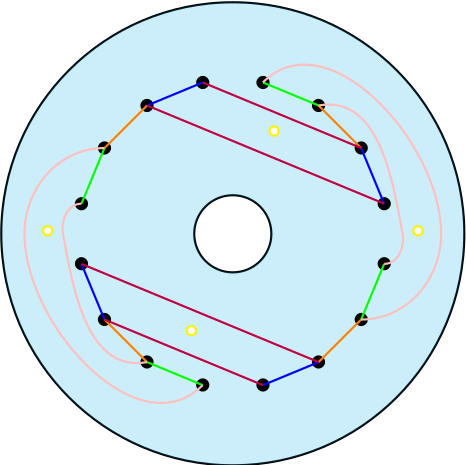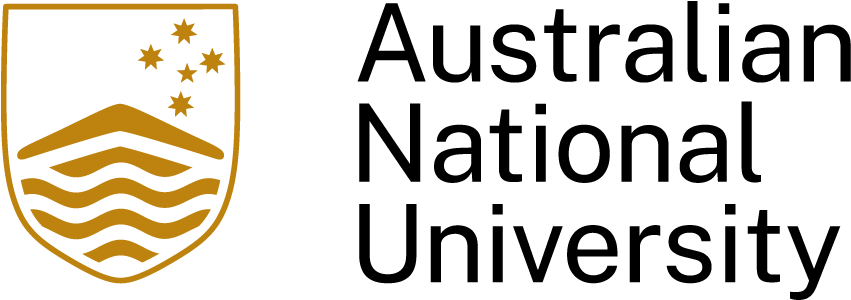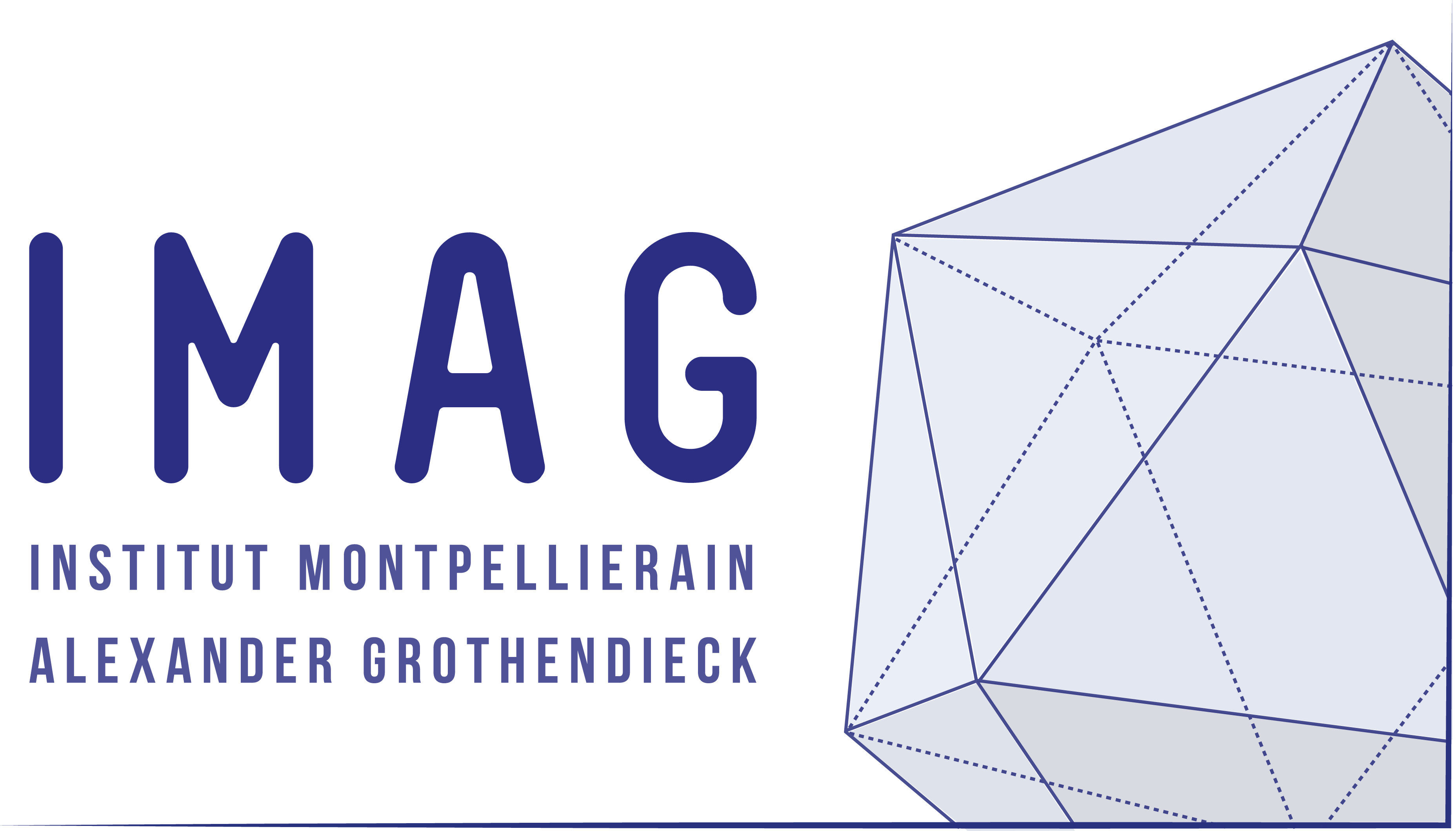Fiddling Around Diagrams in Algebra

What is it about?
This learning seminar will be hosted monthly, with two one-and-a-half hour talks. The thematics will be broadly related to braids, diagrams, and algebraic, geometric and topological methods used to understand them. The goal is to give talks accessible to everyone.
July 25th, 2023
Location
MSI, Overflow seminar room 1.37
Program
- 9:00am Christopher Raymond (ANU)
Linking Temperley-Lieb and Virasoro representations
Motivated by a question Tony posed when I first arrived in Canberra, I want to take an introductory look at the relationship between representations of the Temperley-Lieb algebras and the Virasoro algebra. They are loosely related by taking a limit n -> \infty on the nodes that comprise TL diagrams. Physically, such a limit corresponds to a scaling limit of a lattice model, which is then described by a conformal field theory. In that way, this construction gives rise to representations of the Virasoro algebra. In this talk, I'll give an overview of this link and, if we have time, look at some recent results in some more interesting cases.
- 10:30am Morning tea
- 11:00am TBA
TBA
TBA
June 30th, 2023
Location
MSI, Seminar room 2.48
Program
- 11:00am Anand Deopurkar (ANU)
Stability conditions, metrics, and compactifications, 3
A stability condition on a triangulated category turns the category into a geometric object. We can then import powerful techniques from geometry to the study of triangulated categories and stability manifolds. I will elaborate on this theme. Specifically, I will describe how a stability condition defines a metric on the category. I will describe how this metric can be used to construct a compactification of the stability manifold, using ideas inspired by the study of metrics on Riemann surfaces, namely Teichmuller theory. I will then discuss potential applications, examples, and unexplored areas.
June 27th, 2023 (Algebra and Topology seminar)
Location
MSI, Seminar room 2.48
Program
- 11:00am Anand Deopurkar (ANU)
Stability conditions, metrics, and compactifications, 2
A stability condition on a triangulated category turns the category into a geometric object. We can then import powerful techniques from geometry to the study of triangulated categories and stability manifolds. I will elaborate on this theme. Specifically, I will describe how a stability condition defines a metric on the category. I will describe how this metric can be used to construct a compactification of the stability manifold, using ideas inspired by the study of metrics on Riemann surfaces, namely Teichmuller theory. I will then discuss potential applications, examples, and unexplored areas.
June 20th, 2023
Location
MSI, Board room 2.48
Program
- 9:00am Jack Brand (ANU)
Overtwisted disks in contact 3-manifolds using Morse diagrams
One of the most important questions to ask about a contact structure is whether it is overtwisted or tight. In 1989, Eliashberg proved his famous result that the classification of overtwisted contact structures is equivalent to the classification of homotopy classes of 2-plane fields, and therefore it is the tight contact structures that are geometrically more interesting. More recently, efforts have been made (originally by Goodman, Honda-Kazez-Matic) to detect whether a contact structure compatible with an open book decomposition is overtwisted or tight by studying the monodromy of the open book decomposition. In this talk, we provide a new criterion for the overtwistedness of a contact structure using the Morse diagrams compatible with an open book decomposition.
- 10:30am Morning tea
- 11:00am Anand Deopurkar (ANU)
Stability conditions, metrics, and compactifications
A stability condition on a triangulated category turns the category into a geometric object. We can then import powerful techniques from geometry to the study of triangulated categories and stability manifolds. I will elaborate on this theme. Specifically, I will describe how a stability condition defines a metric on the category. I will describe how this metric can be used to construct a compactification of the stability manifold, using ideas inspired by the study of metrics on Riemann surfaces, namely Teichmuller theory. I will then discuss potential applications, examples, and unexplored areas.
May 8th and 9th
See the workshop page.
March 28th, 2023
Location
MSI, Board room 2.48
Program
- 9:30am Anthony Henderson (Defence Science and Technology Group and The University of Sydney (Honorary Professor))
Artin groups of reflection subgroups
Let W be a Coxeter group with Coxeter generating set S and corresponding Artin group B. Any subgroup W' of W generated by reflections (conjugates of elements of S) has its own Coxeter generating set S' induced by S, so it has its own Artin group B'. The relationship between B' and B is straightforward in the case when S' is a subset of S, less so in general. After illustrating the issues, I will explain how known results on the normalizer of W' in W can be lifted to the level of Artin groups. This is joint work with Thomas Gobet and Ivan Marin.
- 11:00am Morning tea
- 11:30am Anthony Licata
Metrics on triangulated categories (definitions and questions)
I'll give some basic definitions and examples of metrics on triangulated categories, and try to pose some (probably fairly obvious) questions that the definitions suggest. Some of you have probably seen Amnon talk about metrics in the last year or two. This talk will be more elementary than those talks, and the talk will almost definitely have no new theorems. But I'll try to emphasize the relevance of some ideas from geometric group theory in homological algebra, with an eye towards future work.
February 28th, 2023
Location
MSI, Board room 2.48
Program
- 9am Ian Le: Braid varietes
- 10:30am Morning tea
- 11am Hoel Queffelec: Ordering braids and other groups

What is it about?
This learning seminar will be hosted monthly, with two one-and-a-half hour talks. The thematics will be broadly related to braids, diagrams, and algebraic, geometric and topological methods used to understand them. The goal is to give talks accessible to everyone.
July 25th, 2023
Location
MSI, Overflow seminar room 1.37Program
- 9:00am Christopher Raymond (ANU)
Linking Temperley-Lieb and Virasoro representations
Motivated by a question Tony posed when I first arrived in Canberra, I want to take an introductory look at the relationship between representations of the Temperley-Lieb algebras and the Virasoro algebra. They are loosely related by taking a limit n -> \infty on the nodes that comprise TL diagrams. Physically, such a limit corresponds to a scaling limit of a lattice model, which is then described by a conformal field theory. In that way, this construction gives rise to representations of the Virasoro algebra. In this talk, I'll give an overview of this link and, if we have time, look at some recent results in some more interesting cases. - 10:30am Morning tea
- 11:00am TBA
TBA
TBA
June 30th, 2023
Location
MSI, Seminar room 2.48Program
- 11:00am Anand Deopurkar (ANU)
Stability conditions, metrics, and compactifications, 3
A stability condition on a triangulated category turns the category into a geometric object. We can then import powerful techniques from geometry to the study of triangulated categories and stability manifolds. I will elaborate on this theme. Specifically, I will describe how a stability condition defines a metric on the category. I will describe how this metric can be used to construct a compactification of the stability manifold, using ideas inspired by the study of metrics on Riemann surfaces, namely Teichmuller theory. I will then discuss potential applications, examples, and unexplored areas.
June 27th, 2023 (Algebra and Topology seminar)
Location
MSI, Seminar room 2.48Program
- 11:00am Anand Deopurkar (ANU)
Stability conditions, metrics, and compactifications, 2
A stability condition on a triangulated category turns the category into a geometric object. We can then import powerful techniques from geometry to the study of triangulated categories and stability manifolds. I will elaborate on this theme. Specifically, I will describe how a stability condition defines a metric on the category. I will describe how this metric can be used to construct a compactification of the stability manifold, using ideas inspired by the study of metrics on Riemann surfaces, namely Teichmuller theory. I will then discuss potential applications, examples, and unexplored areas.
June 20th, 2023
Location
MSI, Board room 2.48Program
- 9:00am Jack Brand (ANU)
Overtwisted disks in contact 3-manifolds using Morse diagrams
One of the most important questions to ask about a contact structure is whether it is overtwisted or tight. In 1989, Eliashberg proved his famous result that the classification of overtwisted contact structures is equivalent to the classification of homotopy classes of 2-plane fields, and therefore it is the tight contact structures that are geometrically more interesting. More recently, efforts have been made (originally by Goodman, Honda-Kazez-Matic) to detect whether a contact structure compatible with an open book decomposition is overtwisted or tight by studying the monodromy of the open book decomposition. In this talk, we provide a new criterion for the overtwistedness of a contact structure using the Morse diagrams compatible with an open book decomposition. - 10:30am Morning tea
- 11:00am Anand Deopurkar (ANU)
Stability conditions, metrics, and compactifications
A stability condition on a triangulated category turns the category into a geometric object. We can then import powerful techniques from geometry to the study of triangulated categories and stability manifolds. I will elaborate on this theme. Specifically, I will describe how a stability condition defines a metric on the category. I will describe how this metric can be used to construct a compactification of the stability manifold, using ideas inspired by the study of metrics on Riemann surfaces, namely Teichmuller theory. I will then discuss potential applications, examples, and unexplored areas.
May 8th and 9th
See the workshop page.
March 28th, 2023
Location
MSI, Board room 2.48Program
- 9:30am Anthony Henderson (Defence Science and Technology Group and The University of Sydney (Honorary Professor))
Artin groups of reflection subgroups
Let W be a Coxeter group with Coxeter generating set S and corresponding Artin group B. Any subgroup W' of W generated by reflections (conjugates of elements of S) has its own Coxeter generating set S' induced by S, so it has its own Artin group B'. The relationship between B' and B is straightforward in the case when S' is a subset of S, less so in general. After illustrating the issues, I will explain how known results on the normalizer of W' in W can be lifted to the level of Artin groups. This is joint work with Thomas Gobet and Ivan Marin. - 11:00am Morning tea
- 11:30am Anthony Licata
Metrics on triangulated categories (definitions and questions)
I'll give some basic definitions and examples of metrics on triangulated categories, and try to pose some (probably fairly obvious) questions that the definitions suggest. Some of you have probably seen Amnon talk about metrics in the last year or two. This talk will be more elementary than those talks, and the talk will almost definitely have no new theorems. But I'll try to emphasize the relevance of some ideas from geometric group theory in homological algebra, with an eye towards future work.
February 28th, 2023
Location
MSI, Board room 2.48Program
- 9am Ian Le: Braid varietes
- 10:30am Morning tea
- 11am Hoel Queffelec: Ordering braids and other groups

